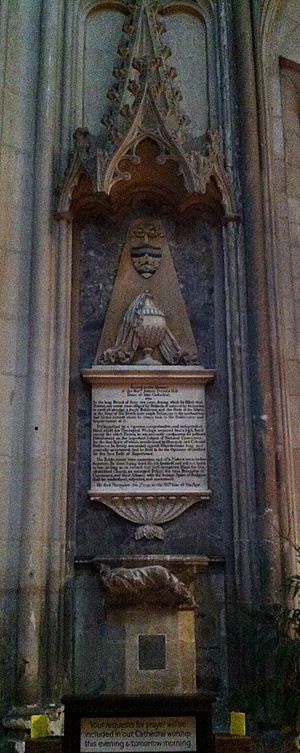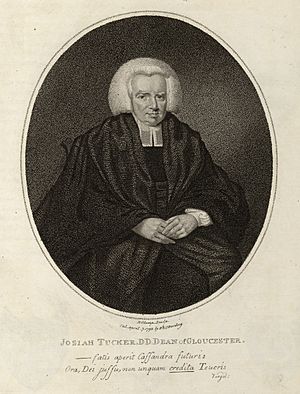Josiah Tucker facts for kids

Josiah Tucker (born December 1713 – died November 4, 1799) was a Welsh church leader. He was also known as Dean Tucker. He became famous as an economist and a writer on politics. His writings focused on ideas like free trade, helping Jewish people gain equal rights (Jewish emancipation), and American independence. He eventually became the Dean of Gloucester, a high position in the church.
Contents
Early Life and Church Career
Josiah Tucker was born in Laugharne, Carmarthenshire, Wales. His father owned a small piece of land near Aberystwyth. He sent Josiah to Ruthin School in Denbighshire. Tucker later won a special scholarship, called an exhibition, to study at St John's College, Oxford. He earned his first degree in 1736 and a master's degree in 1739. He received his Doctor of Divinity degree in 1755.
In 1737, Tucker started working as a curate at St. Stephen's Church in Bristol. Two years later, he became the main priest, or rector, of All Saints' Church in the same city. He also got a smaller role in the Bristol Cathedral. Bishop Joseph Butler noticed him and Tucker worked for a time as the Bishop's personal chaplain. After another priest passed away in 1749, Tucker became the rector of St. Stephen's Church.
In 1754, Robert Nugent was elected to represent Bristol in Parliament. Tucker supported Nugent, and Nugent's influence likely helped Tucker get promoted. On October 28, 1756, Tucker was appointed to a special position at Bristol Cathedral. Then, on July 13, 1758, he became the Dean of Gloucester. As Dean of Gloucester, Tucker met William Warburton, who became a bishop in 1759. They did not get along well.
Tucker became ill as he got older. In 1790, he wanted to leave his rector position in Bristol. He asked that his assistant priest be allowed to take his place. The church leader at first refused. But after Tucker's friends signed a request for the assistant, Tucker resigned. His assistant then took over the role. Josiah Tucker died on November 4, 1799. He was buried in Gloucester Cathedral, where a monument was built to remember him.
Economic and Political Ideas
Josiah Tucker's first published work criticized Methodism, a new religious movement. He later became well-known for his views on church rules. He defended the Church of England but also said that some rules should be made less strict.
Views on Trade and Naturalization
In Bristol, Tucker became very interested in politics and trade. He was influenced by the ideas of Bishop Butler, applying them to Christian economic thinking. He first became widely known for his writings that supported allowing foreign Protestants and Jews to become British citizens (naturalisation). These ideas were very unpopular. People in Bristol even burned his image and his pamphlets in protest. In these writings, Tucker supported Robert Nugent, who tried to pass a law in Parliament in 1753 to naturalize foreigners.
Tucker gained a strong reputation as an economist. His book A Brief Essay on the Advantages and Disadvantages which Respectively Attend France and Great Britain, with Regard to Trade (1749) was very important. It was translated into French and might have influenced French economists known as physiocrats. In 1755, Thomas Hayter, a bishop and royal teacher, asked Tucker to write a book called Elements of Commerce and the Theory of Taxes. This book was meant to teach the future King George III about trade. Only a part of it was printed, and it was never finished. Some people think Tucker's ideas influenced Adam Smith, another famous economist.
In 1757, Tucker published a travel guide called Instructions for Travellers. This guide was part of a larger, unfinished work about economics. It discussed both the moral and practical sides of travel. It also suggested good ways to write down observations.
Thoughts on War and American Independence
Tucker believed that wars were bad for the economy. In 1763, he wrote against "going to war for the sake of trade." This work was translated by Turgot, a French economist. Turgot also translated another of Tucker's works and wrote to him later, praising his ideas.
Tucker believed as early as 1749 that the American colonies would want to be independent from Britain. He thought this would happen once they no longer needed Britain's help. He continued to support American independence throughout the American Revolutionary War. He wrote pamphlets, including A Series of Answers to Certain Popular Objections Against Separating from the Rebellious Colonies (1776).
Tucker disagreed with other thinkers like Edmund Burke and John Wilkes about Britain's American colonies. He had a unique view on the American War of Independence. By 1766, he felt that a separation was unavoidable. However, he was also critical of the Americans. He argued that separating from the colonies was a good idea. He believed that the supposed benefits of colonial trade to Britain were an illusion. He also thought that if the colonies were left alone, they would fight among themselves. Then, they would want to rejoin Britain.
His ideas did not please anyone in England at the time. Tucker was seen as a prophet of doom, and he even published under the name "Cassandra" in newspapers. However, many economists who supported laisser-faire (limited government involvement in the economy) later agreed with his views. His most popular writing about America was Cui Bono? (meaning "Who benefits?"). It was written as letters to Jacques Necker (1781). In it, Tucker argued that the war was a mistake for all countries involved.
Other Economic and Political Views
In political theory, Tucker disagreed with the idea of a social contract. This idea was popular among many writers of his time. In 1781, he published A Treatise Concerning Civil Government. This book criticized John Locke's ideas, saying they led to democracy. Tucker supported the British constitution instead. In 1785, he applied his theories to arguments about trade between Ireland and Great Britain.
Tucker wanted to see Britain's population grow. He even suggested a tax on single men. He welcomed immigrants and was sad to see people move to America. He strongly supported the free market. He wrote against monopolies, which are when one company controls everything. This included the exclusive rights of trading companies like the East India Company. He also criticized strict guild rules for apprentices and the Navigation Acts, which limited trade. He wanted to remove anything that stopped the free market from working.
Family Life
Josiah Tucker's first wife was a widow named Mrs. Woodward. She had a son named Richard Woodward. Tucker helped educate his stepson, who later became a church leader himself. In 1781, Tucker married his housekeeper, Mrs. Crowe.
 | Jackie Robinson |
 | Jack Johnson |
 | Althea Gibson |
 | Arthur Ashe |
 | Muhammad Ali |


